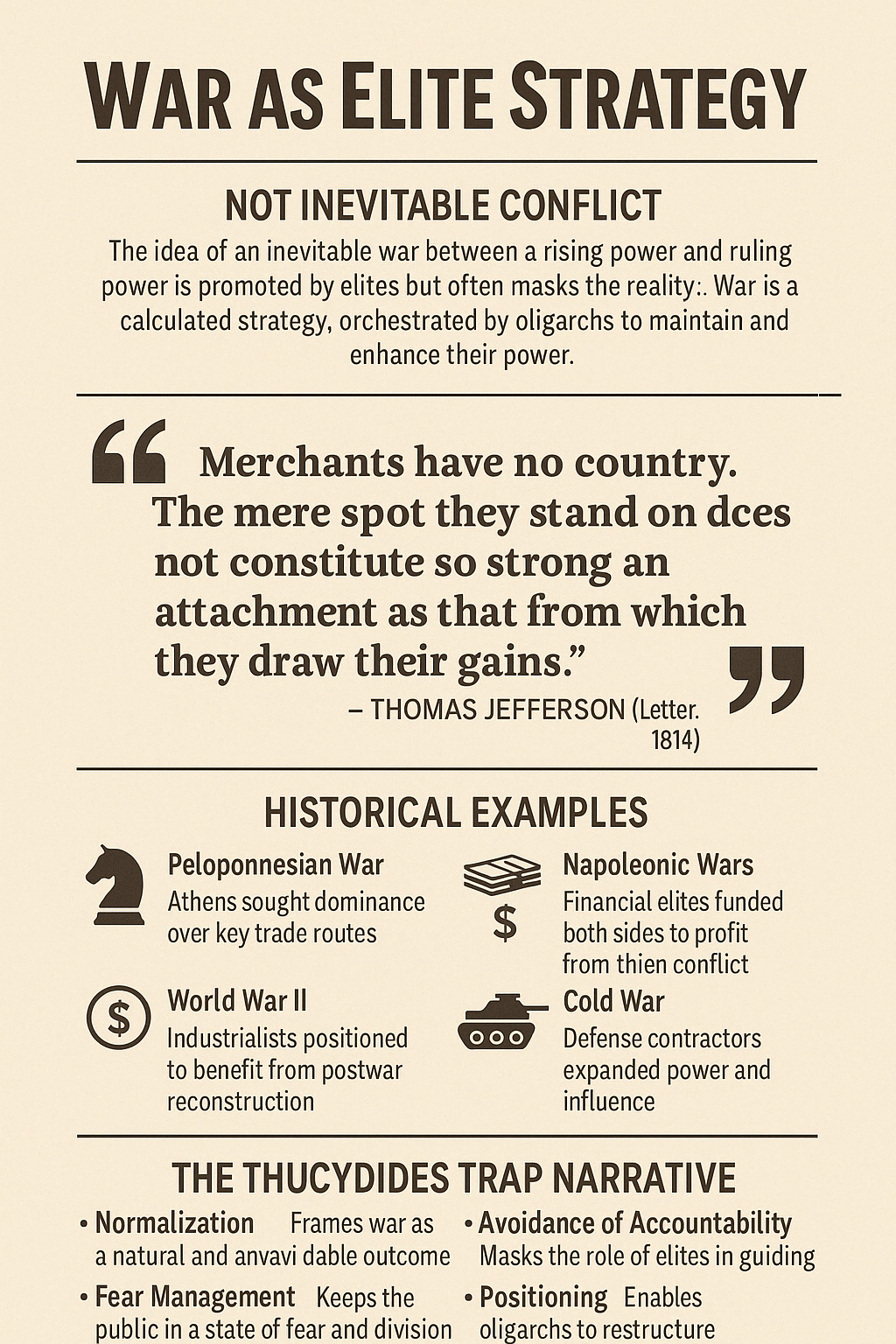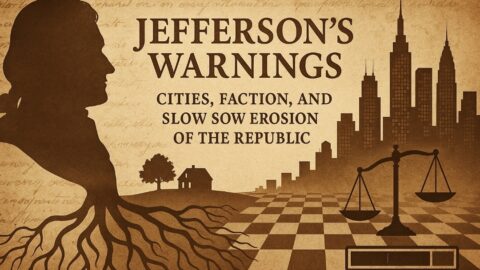Rethinking the Thucydides Trap: A Manufactured Narrative?
The Thucydides Trap — as made famous today by Graham Allison and many geopolitical analysts — paints war between a rising power (like China) and a ruling power (like the U.S.) as a natural, almost inevitable process.
But seen through a deeper, critical lens, it becomes clear:
- Wars are not accidents caused merely by abstract fear between nations.
- Wars are often deliberate moves orchestrated by global oligarchs — to reshape the global board.
- Narratives like “Thucydides Trap” serve to normalize, rationalize, and hide these elite maneuvers behind the mask of “inevitability.”
In other words:
War is not an unfortunate byproduct — it is often a planned transition strategy.
Merchants, Profiteers, and War: Jefferson’s Warning
Thomas Jefferson, with his deep distrust of mercantile elites, saw this centuries ago:
“Merchants have no country. The mere spot they stand on does not constitute so strong an attachment as that from which they draw their gains.”
— Letter to Horatio G. Spafford, 1814
Jefferson’s meaning was clear:
- The true allegiance of merchants (today’s corporations, banks, oligarchs) is not to nations, peoples, or principles.
- It is to profit, access, and power — wherever they can maximize them.
- They will move operations, switch sides, and fund wars if it benefits their position.
Thus:
- Wars are business strategies.
- Nations are pawns.
- Allegiances shift based on where the most gain can be secured.
Historical Evidence: Wars as Elite Chess Matches
Throughout history, we find that wars often coincide with major repositioning of elite interests:
| War | Elite Objectives |
|---|---|
| Peloponnesian War | Athenian merchants sought to control key trade routes; Spartan oligarchs wanted to protect their slave economy. |
| Wars of the Roses | English noble houses fighting for control of dynastic wealth. |
| American Revolution | Mercantile elites in the colonies seeking independence from British monopolistic constraints. |
| Napoleonic Wars | European banking families (like the Rothschilds) expanded influence by financing both sides. |
| World War I | British and American financial elites realigned the global monetary system toward U.S. dollar supremacy. |
| World War II | U.S. industrialists, financiers (some initially sympathetic to Nazi Germany) repositioned for post-war global domination. |
| Cold War | Military-Industrial Complex — massive government-corporate expansion justified by endless “threat” of Soviet power. |
Pattern:
War = opportunity to rebuild the pyramid of power on new geographic, financial, and technological foundations.
Modern Application: America, China, and the New Chessboard
Today, with America in decline:
- Global oligarchs see China, Asia, and emerging digital systems as the new centers of gravity.
- If war (even a cold war or proxy war) erupts, it provides:
- Justification for reorganizing supply chains.
- Resetting financial systems (introduction of CBDCs, central digital currencies).
- Reengineering populations through fear, nationalism, and obedience.
- Massive profits for defense contractors, tech surveillance companies, and reconstruction ventures.
In short:
- A transition of power is happening.
- A war could act as the “controlled demolition” of the old American-centric system.
- The real goal is not “victory” — it is strategic repositioning and restructuring of global power.
The same way the Roman oligarchs moved East,
the same way the British elites embedded into America, today’s global oligarchs are preparing their transition — regardless of national loyalties.
The Thucydides Trap as Psychological Conditioning
By promoting the “Thucydides Trap” narrative, elites achieve several objectives:
| Purpose | How it Works |
|---|---|
| Normalization | Prepares the public to accept war as “natural” and “inevitable.” |
| Avoidance of Accountability | Masks elite manipulation; shifts blame to abstract “forces of history.” |
| Fear Management | Keeps populations fearful, divided, and focused on external threats rather than internal betrayal. |
| Positioning | Enables financial and corporate elites to move resources, adjust markets, and change allegiances behind the scenes. |
Thus, the Thucydides Trap is not just historical observation —
it is psychological preparation for another elite-engineered shift.
Conclusion: War as Chess, Not Destiny
“Merchants have no country…”
— Jefferson
- Nations are expendable.
- War is merely a mechanism for reordering global hierarchies.
- The true game is invisible to the masses, hidden behind narratives of “inevitability,” “security,” and “competition.”
Understanding this reality strips the mask off the Thucydides Trap narrative.
War is not inevitable, it is constructed. The chess pieces are moved not by nations seeking survival, but by oligarchs seeking power, profit, and permanence.
The real battle for the future is not between America and China.
It is between free, sovereign peoples and the transnational networks of oligarchs who would rule them — by any means necessary.






